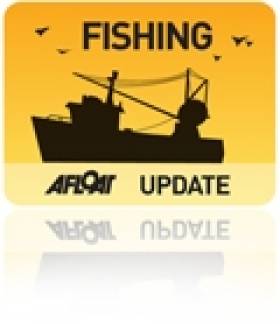Displaying items by tag: Minister of State at the Department of Agriculture, Fisheries and Food
Mr. Sean Connick, T.D. Minister of State at the Department of Agriculture, Fisheries and Food welcomed the agreement reached after two days of talks in Brussels on 2011 quotas for the Irish fishing fleet.
The final agreement will deliver whitefish quotas worth some €116 million, including the protection of Ireland's €54 million prawn fishery. There will be a 10% increase in quota for Ireland's €75 million mackerel industry and a two thirds share, worth approximately €4 million, for Irish fishermen of the new boarfish industry.
Speaking at the end of the negotiations in the early hours of Wednesday (16 December), the Minister said
"The negotiations have been particularly challenging this year with the European Commission proposing cuts across many stocks of commercial importance for Ireland. Consulting with our fishing industry and NGOs, working with other Member States and concentrating on the scientific evidence, was, I believe key to securing a balanced sustainable package."
"This package will help underpin the economic future of our costal communities."
There will be 15% increase in haddock and whiting stocks in the Celtic Sea. While for the cod stocks off the North West and the Irish Sea, the quotas will be reduced by 25% in line with the Recovery Plan for these stocks. For Celtic Sea cod, the current quota level has been maintained for 2011 on the basis of new survey results from the State's Research Vessel "Celtic Explorer".
Minister Connick commented "By introducing new information on Celtic Sea cod, I secured agreement that the current level of TAC will continue into 2011, and may be increased during the year if the new survey results are confirmed by the scientists. However, given the poor state of cod stocks off the North West and in the Irish Sea, cuts were necessary".
Commenting on the 3% reduction in the prawn quota, the Minister said "Prawns are a very important fishery all around our coast. It is the most valuable catch for the Irish whitefish fleet worth €54 million. While the Commission originally proposed a 17% cut, I secured just a 3% decrease in the quota on the basis of a strong scientific case."
The quota for mackerel will be increased by 10%, and should be worth up to €75m in 2011. This is the most important fishery for the North West fleet based in Killybegs and is also important for the South West multi purpose fleet, supporting processing jobs in the coastal communities.
There were also increases in the quota for Celtic Sea herring of 30%, although there were cuts in the North West stock reflecting concerns about the state of those stocks.
Finally, Ireland secured the largest share in an important new fishery for boarfish that will be worth just under €4 million in 2011. The Irish fishing industry has been working with the scientific community to develop a management plan for boarfish, a mid-water shoaling species, now found in large volumes off the South West coast. The agreement reached in Brussels provides for a total allowable catch of some 33,000 tonnes, with two thirds going to Ireland.
Minister Connick commented "In an example of a successful investment in scientific research by industry, we have opened up a new fishery and secured the major stake in that industry. This ensures a new revenue stream for Irish industry into the future. We believe we can now develop a significant and sustainable fishery on this stock, in which we will continue to hold the largest share".





























































